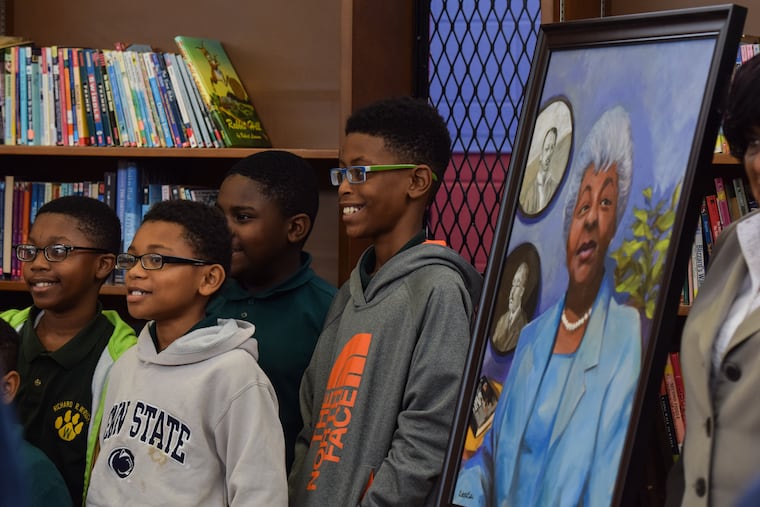Remembering Ruth: Philly honors a trailblazing educator
Hayre battled racism to rise to become a respected educator, the first black high School principal in Philadelphia and, eventually, school board president. A group of Philadelphians gathered Friday to keep her legacy alive.

Latiesha Carter had no idea who Ruth Wright Hayre was.
But someone commissioned Carter — a 22-year-old painter and student working her way through classes at the Pennsylvania Academy of the Fine Arts — to produce a portrait of the legendary Philadelphia educator, and she learned.
Carter learned how Hayre battled racism to rise to become a respected educator, the first black high school principal in Philadelphia and, eventually, school board president; how she paid with her own savings for students to go to college.
On Friday, in a quest to keep Hayre's legacy from being lost to history, Carter and dozens of others gathered in a Strawberry Mansion elementary school library to unveil the portrait.
"Her life," Carter said, "is an inspiration to all of us."
Hayre was a precocious student who graduated from West Philadelphia High at 15 and earned a master's degree from the University of Pennsylvania by age 20. She was turned away from teaching in Philadelphia because the public school system did not hire black secondary school teachers, so went on to teach in Arkansas before earning her doctorate and finally getting hired in Philadelphia.
She came from a family of remarkable people. In 1970, the school system named Richard Wright Elementary at 27th and Dauphin for Hayre's grandfather, who founded the first African American bank in Philadelphia. Richard Wright was born a slave, and after emancipation, he and his mother walked 600 miles so he could attend school.
His granddaughter, who died in 1997, always remembered that.
Christopher McGinley, a current school board member, remembers vividly the first time he talked to Hayre: when she called the McGinley home to talk to his father, then principal of Lehigh Elementary. Hayre was his boss, and she was unhappy with something the principal had done.
"She was a tough boss, and she was a brilliant scholar, a wonderful teacher, a wonderful principal, and somebody who had high standards for herself, and somebody who had high standards for everyone who worked for her," Christopher McGinley said Friday.
"She devoted her life to making life better for others, especially young people," said State Rep. James Roebuck (D., Phila.)
Steve Sattell met Hayre near the end of her life. Sattell, an author and educator, was so moved by her work that he commissioned the portrait and worked with the district to have it hung in the Wright School library. (A portrait of Hayre hangs at school system headquarters, but Sattell wanted one to be more accessible among children.)
"Ruth Wright Hayre knew how to set a tone," Sattell said. "She knew how to navigate obstacles. We need to promote that for a lifetime, for our kids."
At first, Wright fifth graders — children born a decade after Hayre's death — wiggled in their wooden seats Friday as grown-ups made speeches before the portrait was unveiled. But then they started sitting up straighter, listening.
After dignitaries including Ruth Wright Harrison, Hayre's daughter, lifted the cover off the portrait, the fifth graders crowded around to examine it.
"I love it," said Dessarae Ortiz, 10. "This lady made a difference."
Things weren't always easy for Hayre, said Braheem Donaldson, also 10.
"But she wanted to make things better," he said. "For us."